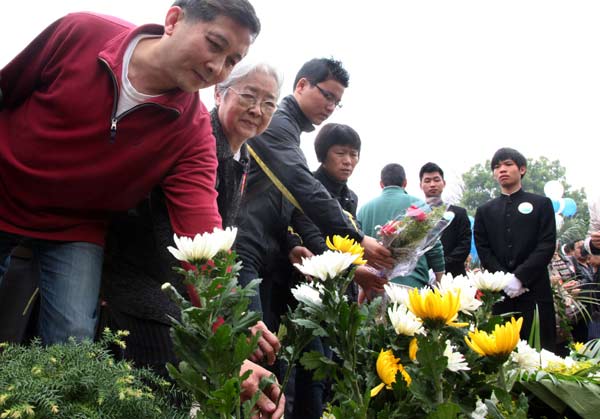Hospitals, Red Cross slow to adopt system
Updated: 2013-06-13 07:24
By Shan Juan and Wang Qingyun (China Daily)
|
||||||||
|
 |
|
An 84-year-old volunteer organ donor (second left), accompanied by her son, pays tributes to deceased body donors at a cemetery in Fuzhou, Fujian province, in April. YANG ENUO / FOR CHINA DAILY |
Fears that donated organs may not be going to patients most in need
A failure to rid transplant hospitals and Red Cross Society branches of old habits is holding back the adoption of China's computerized organ allocation system, experts say.
Health officials set up the Organ Transplant Response System to log all donations in 2010, with allocation procedures, aimed at ensuring fairness and transparency, introduced a year later.
However, Wang Haibo, director of the China Organ Transplant Response System Research Center at the University of Hong Kong, said the system is allocating just 30 percent of donated organs.
He said the online database has logged more than 2,000 donations, yet since April 2011 only 647 organs were allocated through the system.
"Without going through this system, organs may not be going to patients most in need," Wang warned.
The database contains information including a patient's name, location, the severity of their condition and the length of time they have been waiting for a transplant.
"It doesn't include anything about their social status, education background or salary," said Jiang Wenshi, chief statistician for the system. "These factors aren't considered in the process."
The top priorities for organ matches are people who have been in poor heath for the longest time, she said, adding: "A fair allocation of organs ensures a fair chance of life."
The system requires provincial branches of the Red Cross Society of China to cooperate with hospitals to find potential donors and help them and their families complete consent forms, and then inform the nearest hospital authorized to complete transplants, which will procure the organs.
Branches are instructed to upload a donor's identity, death certificate and test results for transmitted diseases to the Organ Transplant Response System immediately, and the organs are allocated automatically to patients at the top of the list.
Yet, the reality is very different.
Procurement officials at some hospitals have complained that the process to activate an allocation is troublesome, while some recipient clinics have raised questions over the ability of other hospitals to preserve organs.
In some places, organ donations are not even going through the system, according to Men Tongyi, a leading transplant surgeon in Shandong province. "The provincial branch of the China Red Cross allocates them," he said.
Gao Min, an organ donation coordinator with the Shenzhen branch of China Red Cross, conceded that due to long-term practices and cooperation, she still tends to inform transplant hospitals she is familiar with any potential donors she finds.
"In general it's local branches of the China Red Cross who have the final say where donations go," she said.
Research shows that an increasing number of people are now volunteering to be organ donors after death, and Chinese officials see greater transparency as the key to that trend continuing and easing the organ shortage.
Shi Bingyi is director of the data center at the Chinese Scientific Registry of Kidney Transplants, an online platform where all transplants on the mainland are recorded and traced.
He said there were 5,314 kidney transplants in 2011, with 154 organs from deceased donors. Last year that number rose to 730, accounting for 12.5 percent of all transplants.
"As of May 17 this year there have been 2,020 kidney transplants, among which the number of kidneys from deceased and living donors equaled the number of those from death-row prisoners," the main source for organs in China, he said.
However, researcher Wang said the trend will not continue if people doubt the fairness of organ allocation.
Some hospitals still have their own waiting lists and allocate organs that they obtain, he said.
"That situation will change, though," he added. "National health officials are going to require all 164 hospitals (authorized to carry out transplants) to report information on organs procured to the database and let the system do the allocation."
Contact the writers at shanjuan@chinadaily.com.cn and wangqingyun@chinadaily.com.cn
Related readings:
Organ recipient has a sporting chance
Registry to open for organ donors
Organ transplants - to donate or not
Fight against organ trade must be steeped up
Truck driver's organs save five lives in Wuhan
9 sentenced for human organ trafficking

 Michelle lays roses at site along Berlin Wall
Michelle lays roses at site along Berlin Wall
 Historic space lecture in Tiangong-1 commences
Historic space lecture in Tiangong-1 commences
 'Sopranos' Star James Gandolfini dead at 51
'Sopranos' Star James Gandolfini dead at 51
 UN: Number of refugees hits 18-year high
UN: Number of refugees hits 18-year high
 Slide: Jet exercises from aircraft carrier
Slide: Jet exercises from aircraft carrier
 Talks establish fishery hotline
Talks establish fishery hotline
 Foreign buyers eye Chinese drones
Foreign buyers eye Chinese drones
 UN chief hails China's peacekeepers
UN chief hails China's peacekeepers
Most Viewed
Editor's Picks

|

|

|

|

|

|
Today's Top News
Shenzhou X astronaut gives lecture today
US told to reassess duties on Chinese paper
Chinese seek greater share of satellite market
Russia rejects Obama's nuke cut proposal
US immigration bill sees Senate breakthrough
Brazilian cities revoke fare hikes
Moody's warns on China's local govt debt
Air quality in major cities drops in May
US Weekly

|

|







